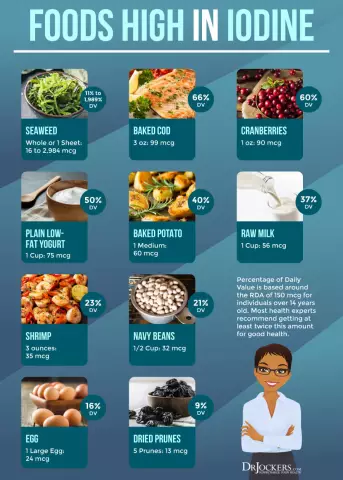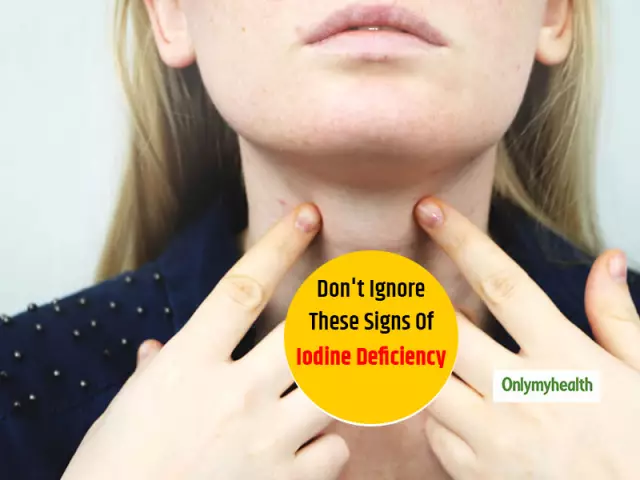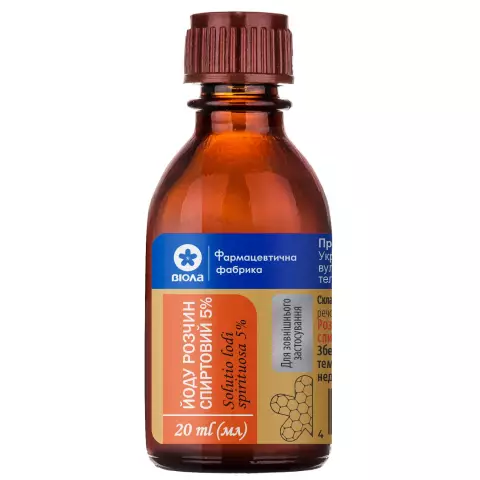- Author Rachel Wainwright wainwright@abchealthonline.com.
- Public 2023-12-15 07:39.
- Last modified 2025-11-02 20:14.
Excess iodine
Iodine is a

microelement vital for every person. First of all, it is needed for the normal functioning of the thyroid gland. Therefore, with a decrease or, conversely, an excess of iodine in the body, its work changes, or rather, the synthesis of thyroid hormones is disrupted.
The daily intake of iodine should not exceed 150 mcg. This rate is somewhat higher for pregnant and lactating women: up to 175-200 mcg / day. For children, the rate is calculated based on age.
In laboratory conditions, it was confirmed that the intake of iodine up to 500-1000 μg / day for a long time does not lead to a change in the functioning of the thyroid gland. Consumption of more than 1000 mcg / day often causes the development of iodine-induced diseases. This is a fairly extensive group of thyroid diseases, which are accompanied by the development of hypo- or hyperthyroidism.
Consuming a large amount of iodine at once is extremely unsafe for humans.
Iodine poisoning is called iodism. More often, people employed in production using iodine suffer from an excess of iodine in the body.
Iodism can develop from inhalation of iodine vapors, with prolonged use of iodine preparations, with increased sensitivity to iodine or its individual intolerance.
Symptoms of excess iodine in the body
Iodine poisoning can be acute or chronic.
Acute develops when a large dose of iodine is received in a short time. Chronic poisoning can develop over the years, giving an erased clinical picture.
As a result of acute poisoning, acute heart failure and pulmonary edema can develop, directly threatening the patient's life. However, these conditions are extremely rare. More often, the main symptoms of iodine excess are irritation of the mucous membranes or skin.
Symptoms of excess iodine:
- Irritation of the mucous membranes of the respiratory tract, which is manifested by coughing, soreness, the presence of mucous discharge from the nose.
- Conjunctival irritation: lacrimation, redness of the eyes. In some cases, the inflammatory process can be delayed. Chronic blepharitis, conjunctivitis, less often cataracts, damage to the optic nerve are formed, and vision decreases over time.
- Drooling as a result of irritation and swelling of the salivary glands.
- The lesion of the skin with an excess of iodine is called iododerma. More often found on the skin of the face, neck, limbs. It manifests itself in the form of acne, accompanied by itching or burning. Acne elements tend to merge. After that, soft painful formations of a blue-purple color up to 3 cm in diameter are formed. Also, skin lesions can be in the form of urticaria, like erysipelas. One of the most severe forms of skin lesions with an excess of iodine in the body is the nodal form of iododerma. Skin contact with iodine in the form of crystals may cause burns or dermatitis. The burns are deep enough. In some cases, it is difficult to heal ulcerative defects.

More rare symptoms of iodine excess:
- metal taste in the mouth;
- specific odor from the mouth and staining of the oral mucosa;
- dizziness, headache;
- lethargy of consciousness;
- burning and sore throat, hoarseness, thirst;
- damage to the gastrointestinal tract: diarrhea and, as a result, weight loss, convulsions, general weakness;
- toxic hepatitis with the following symptoms: pain in the right hypochondrium, yellowness of the skin and mucous membranes;
- damage to the respiratory tract in any department: tracheitis, pharyngitis, sinusitis, bronchitis, etc.;
- kidney damage;
- weakening of the body's defenses and, as a result, frequent ARVI, pneumonia, etc.
Diagnosis of excess iodine
The diagnosis is simple and is based on a carefully collected history. Iodine poisoning is often found in persons working in an enterprise associated with the production of iodine, as a result of which such poisoning can be of a collective nature.
If an excess of iodine is suspected, its level in the blood and urine is determined.
Treatment of excess iodine in the body
In case of acute poisoning, the skin is cleaned, the stomach is washed with a 5% sodium thiosulfate solution.
In case of chronic iodine poisoning, the mechanism of iodine entry into the body is eliminated (consumption with food, work in hazardous industries).
In parallel, therapy is carried out aimed at correcting the work of the thyroid gland, as well as other organs and systems.
In case of violation of water-electrolyte metabolism, infusion therapy is performed.
YouTube video related to the article:
The information is generalized and provided for informational purposes only. At the first sign of illness, see your doctor. Self-medication is hazardous to health!






